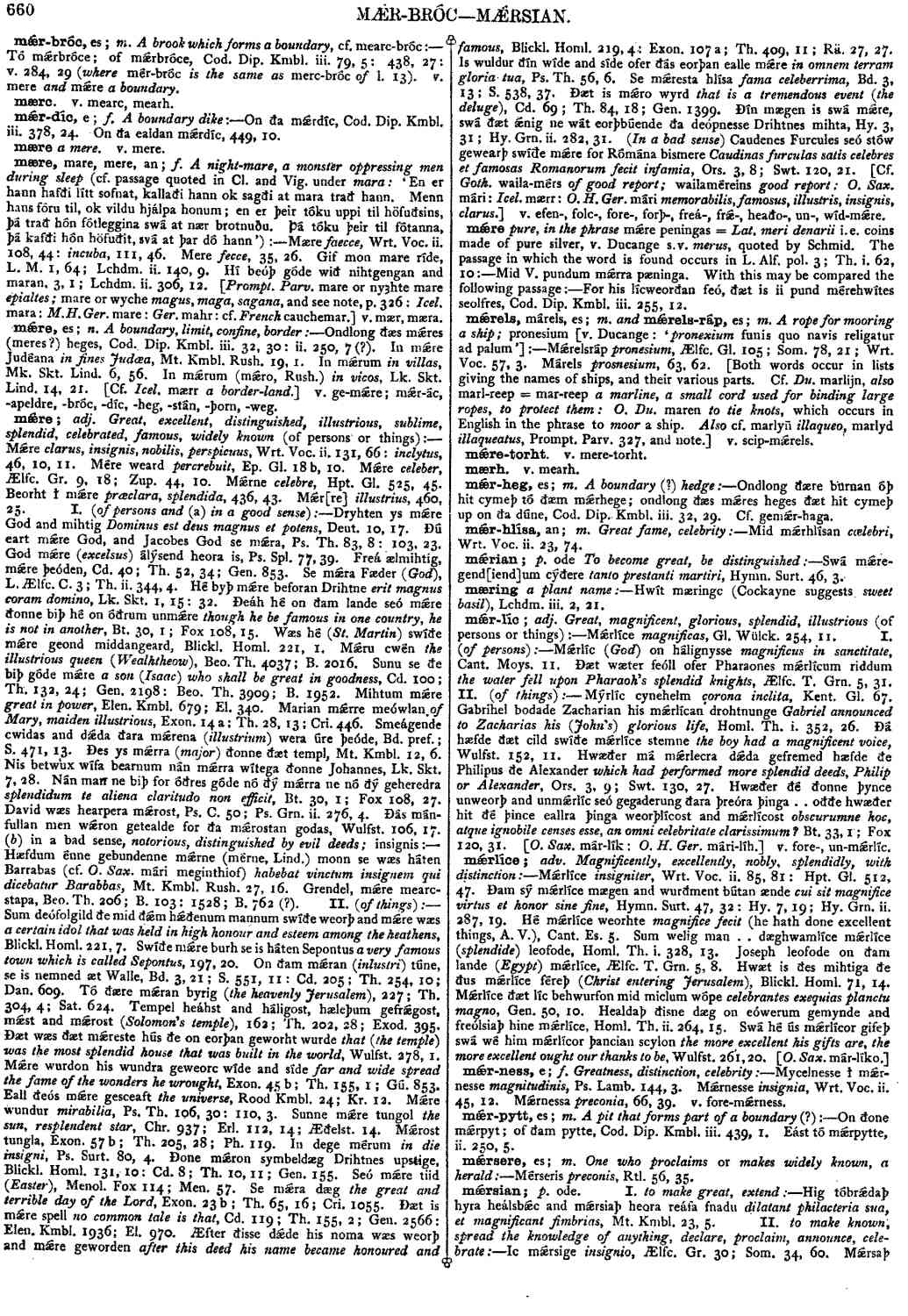mǽre
- adjective
-
Mære
clarus, insignis, nobilis, perspicuus,
- Wrt. Voc. ii. 131, 66:
inclytus,
- 46, 10, 11.
-
Mere weard
percrebuit,
- Ep. Gl. 18b, 10.
-
Mǽre
celeber,
- Ælfc. Gr. 9, 18 ;
- Zup. 44, 10.
-
Mǽrne
celebre,
- Hpt. Gl. 525, 45.
-
Beorht ł mǽre
præclara, splendida,
- 436, 43.
-
Mǽr[re]
illustrius,
- 460, 25.
-
Dryhten ys mǽre God and mihtig
Dominus est deus magnus et potens.
- Deut. 10, 17.
-
Ðú eart mǽre God, and Jacobes God se mǽra,
- Ps. Th. 83, 8 : 103, 23.
-
God mǽre (excelsus) álýsend heora is.
- Ps. Spl. 77, 39.
-
Freá ælmihtig, mǽre þeóden,
- Cd. 40 ;
- Th. 52, 34 ;
- Gen. 853.
-
Se mǽra Fæder (
God
),- L. Ælfc. C. 3 ;
- Th. ii. 344, 4.
-
Hé byþ mǽre beforan Drihtne
erit magnus coram domino.
- Lk. Skt. 1. 15: 32.
-
Ðeáh he on ðam lande seó mǽre ðonne biþ hé on óðrum unmǽre
though he be famous in one country, he is not in another,
- Bt. 30, 1 ;
- Fox 108, 15.
-
Wæs hé ( St. Martin ) swíðe mǽre geond middangeard,
- Blickl. Homl. 221, 1.
-
Mǽru cwén
the illustrious queen (Wealhtheow),
- Beo. Th. 4037 ;
- B. 2016.
-
Sunu se ðe biþ góde mǽre
a son (Isaac) who shall be great in goodness,
- Cd. 100 ;
- Th. 133, 24 ;
- Gen. 2198: Beo. Th. 3909 ;
- B. 1952.
-
Mihtum mǽre
great in power,
- Elen. Kmbl. 679 ;
- El. 340.
-
Marian mǽrre meówlan.
of Mary, maiden illustrious,
- Exon. 14 a ;
- Th. 28, 13 ;
- Cri. 446.
-
Smeágende cwidas and dǽda ðara mǽrena (illustrium) wera úre þeóde,
- Bd. pref. ;
- S. 471, 13.
-
Ðes ys mǽrra (major) ðonne ðæt templ,
- Mt. Kmbl. 12, 6.
-
Nis betwux wífa bearnum nán mǽrra wítega ðonne Johannes,
- Lk. Skt. 7, 28.
-
Nán man ne biþ for óðres góde nó ðý mǽrra ne nó ðý geheredra
splendidum te aliena claritudo non efficit.
- Bt. 30, 1 ;
- Fox 108, 27.
-
David wæs hearpera mǽrost,
- Ps. C. 50 ;
- Ps. Grn. ii. 276, 4.
-
Ðás mán*-*fullan men wǽron getealde for ða mǽrostan godas,
- Wulfst. 106, 17.
-
Hæfdum énne gebundenne mǽrne (mérne. Lind.) monn se wæs háten Barrabas (cf. O. Sax. mári meginthiof)
habebat vinctum insignem qui dicebatur Barabbas,
- Mt. Kmbl. Rush. 27, 16.
-
Grendel, mǽre mearc-stapa,
- Beo. Th. 206 ;
- B. 103: 1528 ;
- B. 762 (?) .
-
Sum deófolgild ðe mid ðǽm hǽðenum mannum swíðe weorþ and mǽre wæs
a certain idol that was held in high honour and esteem among the heathens,
- Blickl. Homl. 221, 7.
-
Swíðe mǽre burh se is háten Sepontus
a very famous town which is called Sepontus,
- 197, 20.
-
On ðam mǽran (inlustri) túne, se is nemned æt
- Walle, Bd. 3, 21 ;
- S. 551, 11: Cd. 205 ;
- Th. 254, 10 ;
- Dan. 609.
-
Tó ðære mǽran byrig
(the heavenly Jerusalem),
- 227 ;
- Th. 304, 4 ;
- Sat. 624.
-
Tempel heáhst and háligost, hæleþum gefrǽgost, mǽst and mǽrost
(Solomon's temple),
- 162 ;
- Th. 202, 28 ;
- Exod. 395.
-
Ðæt wæs ðæt mǽreste hús ðe on eorþan geworht wurde
that (the temple) was the most splendid house that was built in the world.
- Wulfst. 278, 1.
-
Mǽre wurdon his wundra geweorc wíde and síde
far and wide spread the fame of the wonders he wrought.
- Exon. 45 b ;
- Th. 155, l ;
- Gú. 853.
-
Eall ðeós mǽre gesceaft
the universe.
- Rood Kmbl. 24 ;
- Kr. 12.
-
Mǽre wundur
mirabilia,
- Ps. Th. 106, 30: 110, 3.
-
Sunne mǽre tungol
the sun, resplendent star.
- Chr. 937 ;
- Erl. 112, 14 ;
- Æðelst. 14.
-
Mǽrost tungla,
- Exon. 57 b ;
- Th. 205, 28 ;
- Ph. 119.
-
In dege mérum
in die insigni,
- Ps. Surt. 80, 4.
-
Ðone mǽron symbeldæg Drihtnes upstige,
- Blickl. Homl. 131, 10: Cd. 8 ;
- Th. 10, II ;
- Gen. 155.
-
Seó mǽre tiid
(Easter),
- Menol. Fox 114 ;
- Men. 57.
-
Se mǽra dæg
the great and terrible day of the Lord,
- Exon. 23 b ;
- Th. 65, 16 ;
- Cri. 1055.
-
Ðæt is mǽre spell
no common tale is that,
- Cd. 119 ;
- Th. 155, 2 ;
- Gen. 2566: Elen. Kmbl. 1936 ;
- El. 970.
-
Æfter ðisse dǽde his noma wæs weorþ and mǽre geworden
after this deed his name became honoured and famous,
- Blickl. Homl. 219, 4-: Exon. 1073 ;
- Th. 409, 11 ;
- Rä. 27, 27.
-
Is wuldur ðín wíde and síde ofer ðás eorþan ealle mǽre
in omnem terram gloria tua.
- Ps. Th. 56, 6.
-
Se mǽresta hlísa
fama celeberrima,
- Bd. 3, 13: S. 538, 37.
-
Ðæt is mǽro wyrd
that is a tremendous event (the deluge),
- Cd. 69 ;
- Th. 84, 18 ;
- Gen. 1399.
-
Ðín mægen is swá mǽre, swá ðæt ǽnig ne wát eorþbúende ða deópnesse Drihtnes mihta,
- Hy. 3, 31 ;
- Hy. Grn. ii. 282, 31.
-
(In a bad sense)
Caudenes Furcules seó stów gewearþ swíðe mǽre for Rómána bismere
Caudinas furculas satis celebres et famosas Romanorum fecit infamia,
- Ors. 3, 8 ;
- Swt. 120, 21.
Bosworth, Joseph. “mǽre.” In An Anglo-Saxon Dictionary Online, edited by Thomas Northcote Toller, Christ Sean, and Ondřej Tichy. Prague: Faculty of Arts, Charles University, 2014. https://bosworthtoller.com/22175.
Checked: 1